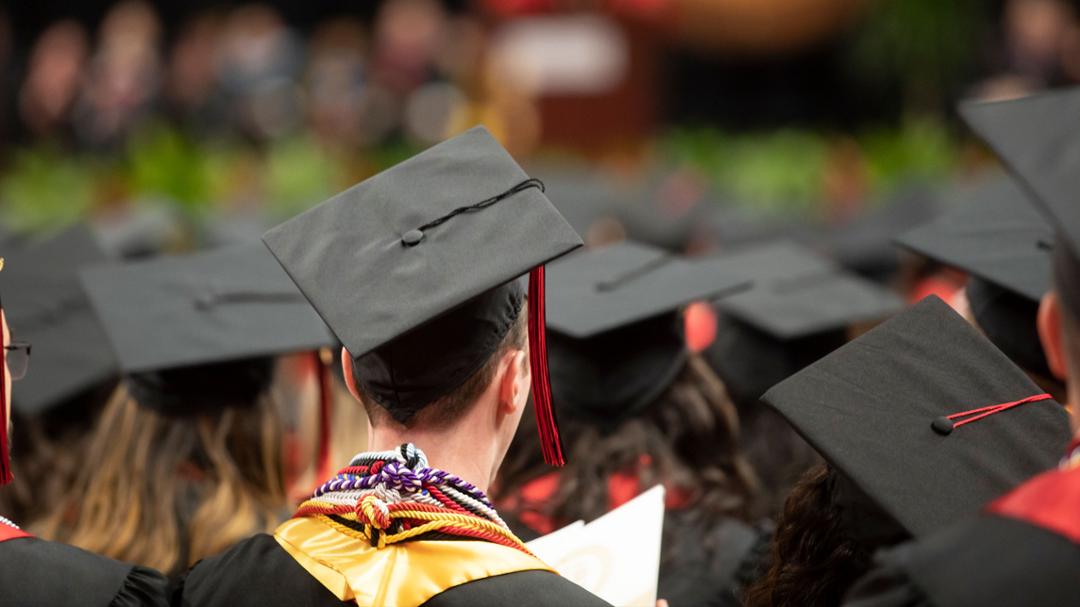Investment in people and processes translates into improved four- and six-year graduation rates.
Texas Tech University’s steadfast commitment to student success has delivered results in the most tangible way possible – higher graduation rates.
More Texas Tech students are completing degree requirements and hitting the commencement finish line as a result of the university’s investment in resources such as the Raider Success Hub, an advising excellence office and student success specialists.
Texas Tech has shown remarkable progress in its graduation rates over the last decade. The university’s six-year rate of 69% is 10 percentage points higher than it was 10 years ago. The four-year rate of 51% is a 50% improvement over 10 years ago.
This success is also reflected in a record number of students graduating. During the 2023-24 academic year, Texas Tech conferred 9,994 degrees to more than 9,800 students, a significant increase compared to the 2019-2020 academic year that saw students earn just more than 8,500 degrees.
The numbers are proof of the university’s unwavering commitment to providing the necessary resources for all students to have an exceptional educational experience that results in a college diploma, facts highlighted in Texas Tech President Lawrence Schovanec’s State of the University address last September.
“At Texas Tech, our first priority has always been student success. Graduating is the most important measure of that success,” said Schovanec. “These improvements in our graduation rates reflect our commitment to providing the tools and support where every student can achieve their goals.”
Texas Tech has made student success a centerpiece of its overall strategy. The university unveiled the Raider Success Hub almost two years ago in response to a growing student body and the lingering impacts of the COVID-19 pandemic. The basic idea was a more holistic approach designed to surround students with a team of people dedicated to their success.
With one click, students have access to not only academic advisors, but also financial advisors, life coaches and other resources meant to help them realize they are not alone on campus. In other words, students now have a virtual team of supporters in their corner focused on communicating with students, collaborating to help them achieve their goals and connecting them with necessary resources as quickly as possible.
The emphasis moved from reacting to student concerns to being proactive and anticipating where students might need support through a coordinated team approach. To help augment that initiative, Texas Tech deployed a group of 22 student success specialists who are embedded in colleges across campus and devoted to building relationships with students to get in front of and resolve challenges.
In many ways, the specialists are subject matter experts in all things Texas Tech, handling a wide variety of student questions and connecting students with necessary resources. They also follow up with students to ensure progress was made. Since the Raider Success Hub came online, specialists have responded to thousands of alerts and handled more than 4,200 student appointments with the number continuing to trend upward.
For example, in the fall 2024 semester, specialists handled 1,238 student appointments, an increase of 149% over the spring 2023 term. The number of unique students connecting with specialists also increased by almost 40% from fall 2023 to fall 2024.
Along those same lines, Texas Tech added 20 new academic advisors and established the advising excellence office in October 2023. Since January 2024, the office has hosted more than two dozen activities and invested more than $30,000 in professional development opportunities while 61 advisors have been certified as Mental Health First Responders.
“Raider Success Hub has transformed how we support student success at Texas Tech by turning vision into action through the integration of people, processes and technology,” said Mitzi Lauderdale, vice provost for academic innovation and student success. “This proactive, relationship-driven approach has scaled connections while emphasizing the importance of personalized outreach, ensuring students feel connected, supported and empowered to reach their goals. Our record graduation rates highlight our commitment to student success and the impact of campuswide collaboration.”
Other notable six-year graduation-rate increases occurred in the Edward E. Whitacre Jr. College of Engineering, which saw an improvement of almost six percentage points, and the College of Health & Human Sciences, which improved by more than five percentage points. University Programs likewise improved by more than five percentage points.

